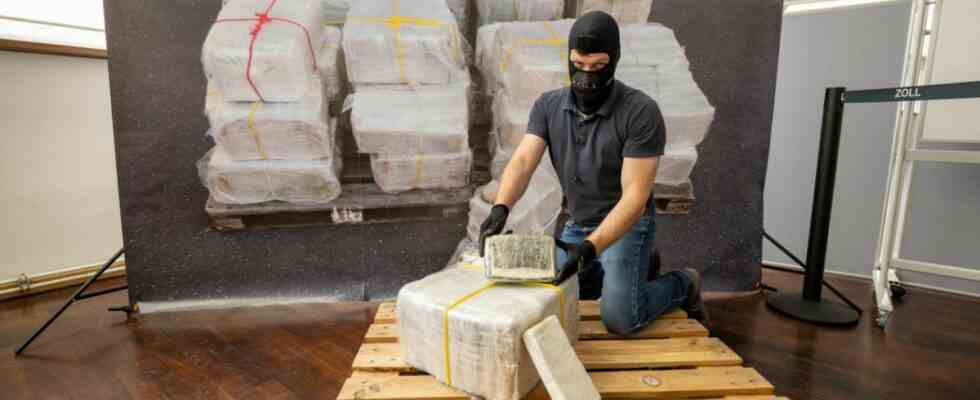1075 kilograms of cocaine. More than a ton. Bavarian customs investigators seized this hard-to-imagine amount of the drug, thus thwarting a huge deal. Estimated value of the contraband: 109 million euros. The investigators reported with corresponding euphoria on Monday at a press conference on the details of the search success. Jürgen Thiel, head of combating drug smuggling at the Munich Customs Investigation Office, speaks of a record: the largest single quantity of cocaine ever seized in Bavaria. There has never been more than 1000 kilograms. He compares the investigation to a crime thriller.
Three suspects are in custody in Bavaria, the men from the Netherlands are 22, 26 and 45 years old. They were caught picking up the drugs. The search for the backers continues internationally.
There was coke stuck between medical products
It was on the evening of June 15 when the Bavarian authorities received a tip from foreign colleagues: they should take a closer look at the container terminal in Aschaffenburg. A freight container that had come to Lower Franconia from the Dominican Republic via Hamburg was stored there. Supposedly filled with medical products for a company in Hesse.
The investigators went out and actually found medical devices – and in between dozens of cocaine packages wrapped in plastic, each weighing one kilogram. It is an investigative success that gives an idea of the dimension of the cocaine trade. “Ten years ago, one ton was the amount that was seized throughout Germany every year,” says Griesmeier.
“I could feel the emotions in the phone calls when they saw the packages and there were more and more,” describes Thiel. However, the euphoria quickly turned into plans for undercover investigations. In order to catch the middlemen, the emergency services observed the transport of the container from Aschaffenburg to Friedberg in Hesse. There, in the company’s parking lot, investigators waited around the clock for five days. At dawn on June 21, three men got to work on the delivery truck, cutting open the container with bolt cutters. The investigators struck, all three suspected drug smugglers were arrested.
“According to the current status of the investigation, it can be assumed that the company that made the medical devices was not involved in the trade,” says Jürgen Thiel.
The men face up to 15 years in prison
The suspects are in custody because of the risk of absconding, in three different prisons in Aschaffenburg, Würzburg and Nuremberg, so that they cannot coordinate, as the chief public prosecutor Monika Schramm explained. “Trade in narcotics in no small quantity,” is the accusation from the Aschaffenburg public prosecutor’s office. The suspect could face up to 15 years in prison, the penalty range allows for that.
“The procedure takes into account, for example, the enormous amount of cocaine, whether the suspects will confess and the active ingredient content of the drugs,” says Schramm. A laboratory determined the latter particularly quickly because of the explosive nature of the case: the active ingredient content is 85 to 90 percent. “It’s good stuff,” says Chief Detective Griesmeier.
The suspects have not yet made a confession. Only one of them has a criminal record for illegally importing drugs, but according to the juvenile criminal law and that is already statute-barred. The investigators are aware that the police only caught the so-called small fish of a global drug trade. “When it comes to quantities of one ton of cocaine, there are of course masterminds in the background,” says Rolf Wundrack, representative of the customs investigation office. “The international investigations in other European countries are aimed at them, in this case in the Netherlands.” More detailed information could not be given for investigative reasons. A particularly large team should now take care of the allegedly lengthy investigations.
The drugs will eventually be burned
The cocaine trade is a business that has surpassed itself in its own superlatives in recent years. After cannabis, coke is the most commonly used drug in the European Union. According to a report by the European Police Agency (Europol) and the European Monitoring Center for Drugs and Drug Addiction (EMCDDA), more than 214 tonnes of cocaine were seized in the EU in 2020. It was not until 2021 that Bavaria, at 740 kilograms, seized the second largest amount within an investigation. With its central location, Bavaria was already a common drug transshipment point for heroin transports from the Near and Middle East via the Balkan route. It is also conceivable for the cocaine trade that Bavaria will be passed as a transit zone.
Part of the confiscated amount is on display at the back of the press conference room. Rectangular packets of compressed coke wrapped in plain gray paper. An armed customs officer guards the goods. “I’m proud of the cooperation between GER Nordbayern, the customs investigation office and the police,” says Wundrack. “These packages,” he says, pointing to the far corner of the room, “don’t just fly out.” And what happens to the cocaine now? It just gets burned in the end.

